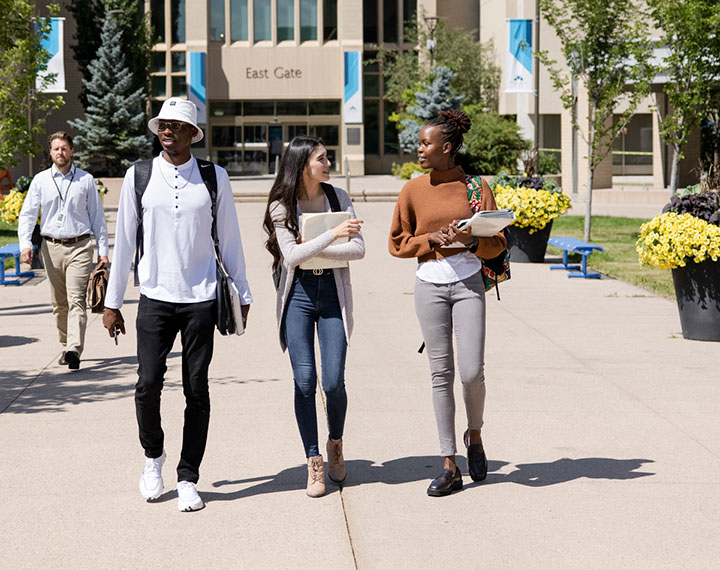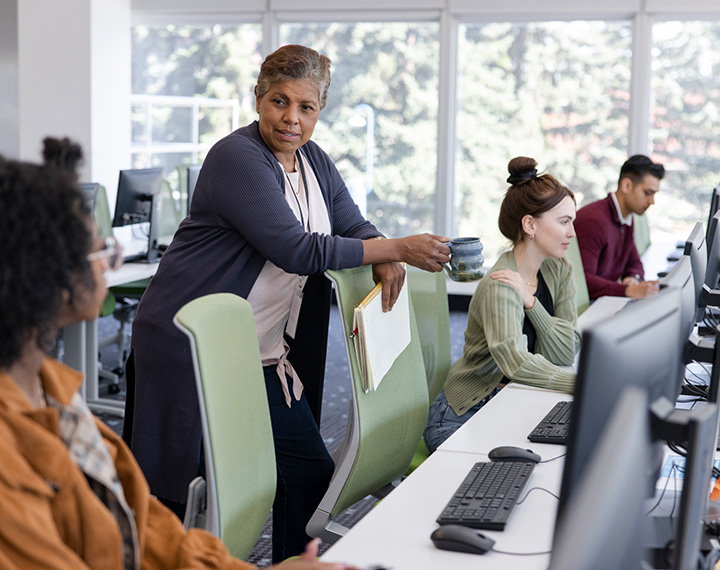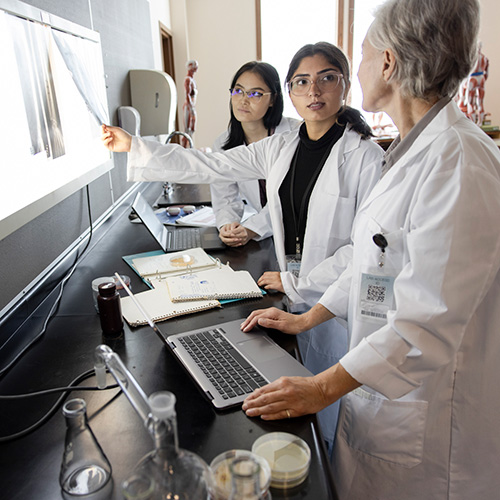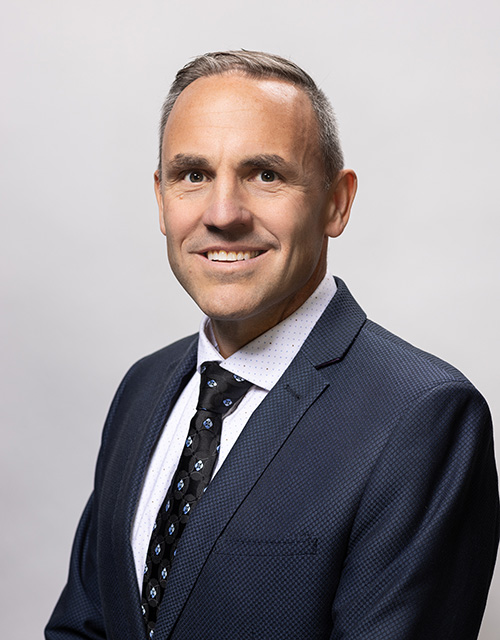Connect.
Inspire.
Transform.

2023-2030 Academic Plan
Connect. Inspire. Transform., Mount Royal University’s 2023-2030 Academic Plan, sets our strategic academic direction to 2030 and beyond. It is the result of an in-depth strategic planning and development process, involving extensive consultations with Mount Royal faculty, staff, students, alumni and external partners.
The Academic Plan establishes the top seven priorities and 21 initiatives that we will address to achieve the academic goals set out in Mount Royal’s 2023-2030 University Strategic Plan. It is a directional document, designed to inform strategic decision-making and resource allocation across Academic Affairs and other divisions, as part of a broader institutional planning framework.
View full plan (PDF)Connect. Inspire. Transform.
At the heart of the 2023-2030 Academic Plan is a desire to remain true to who we are — a student-focused undergraduate university built on teaching excellence and grounded in community — while embracing the vast societal changes we face in today’s world.
As we implement this plan, “Connect. Inspire. Transform.” will guide each step we take.
Connect. Inspire. Transform. is an authentic and focused academic plan that reflects the vision and voice of our community. Through this plan, we will expand upon our strengths and deepen connections throughout our community.
Chad London, PhD,
Provost and Vice-President, Academic
Strategic priorities and supporting initiatives
We identified seven strategic priorities and 21 supporting initiatives to help us achieve the academic goals set out in the University Strategic Plan. Though presented in the order below, these strategic priorities are of equal importance.
Growth and access
Sustainably grow enrolment, programming and pathways to respond to projected demand for high-quality post-secondary education.
Supporting initiatives
- Develop a cross-institutional Strategic Enrolment Management plan to achieve 10% growth in undergraduate students and 10% growth in Continuing Education students by 2030.
- Launch new programs and stackable credentials, such as post-graduate programs (certificates and diplomas) and micro-credentials, to address the evolving education and career goals of learners and the needs of employers.
- Expand admission pathways and retention strategies for equity-denied students to provide greater opportunities for academic success.
Liberal education
Strengthen General Education to better prepare students with essential knowledge and skills for academic success, professional growth and the broader aims of a liberal education.
Supporting initiatives
- Revise the General Education model to support students in shaping their education around their goals, interests, prior learning experiences and program of study, while engaging a broad liberal education.
- Increase supports for faculty to develop and deliver a liberal education.
- Develop an ongoing strategy to ensure students understand the value of General Education, and faculty and staff can better support its role in a Mount Royal education.
Liberal education
Expand experiential learning opportunities across all programs to ensure students can connect theory to practice, achieve personal and professional growth, and provide meaningful contributions to their communities.
Supporting initiatives
- Develop a cross-institutional experiential learning framework that streamlines the delivery, coordination and tracking of experiential learning activities.
- Create more experiential learning opportunities for students on campus, off campus and through community partnerships.
- Improve access to experiential learning opportunities by addressing barriers for students to participate.
Intercultural competence
Provide more teaching and learning opportunities with international and intercultural components, to uphold and advance principles of equity, diversity and inclusion.
Supporting initiatives
- Identify and implement ways to incorporate more local, international and online global learning experiences into programs and courses.
- Increase supports for faculty to develop and deliver course content focused on building intercultural competence through global learning and critical self-reflection.
- Provide more immersive intercultural learning opportunities by expanding study abroad, field schools and faculty exchanges.
Indigenization and decolonization
Integrate Indigenous ways of knowing and perspectives into curriculum, applying the principles of the United Nations Declaration on the Rights of Indigenous Peoples and the recommendations of the Truth and Reconciliation Commission of Canada.
Supporting initiatives
- Retain and recruit more Indigenous faculty to teach Indigenous ways of knowing, and support the development and integration of program-focused Indigenous content.
- Develop Indigenous curriculum within degree programs and General Education.
- Increase supports for faculty in the teaching and learning of Indigenous perspectives and realities.
Inclusive and accessible programming
Diversify pedagogical practices and course delivery options to enhance the learning experience and support the evolving needs of students.
Supporting initiatives
- Increase supports for faculty to apply new approaches to curriculum development and delivery, where appropriate, to better meet the diverse learning needs of students.
- Assess and adjust programs to achieve the optimal mix of in-person, online and blended delivery, ensuring a high-quality learning experience whereby students can meaningfully interact with faculty, regardless of course modality.
- Offer more course options during the spring and summer semesters to give students greater flexibility in managing their schedules and accelerating their time to completion.
Research and scholarship
Grow research and scholarship to advance knowledge, inform teaching and curriculum, and create stronger connections with the communities we serve.
Supporting initiatives
- Expand undergraduate student research opportunities to provide greater and more equitable access for students.
- Grow funded research to foster the advancement of knowledge, and inform the teaching and learning experience.
- Build and strengthen research partnerships and knowledge mobilization within the community.
Moving ahead
Implementation
Successful implementation of the Academic Plan involves collaboration across the University. Initiatives are being (and will be) led by various existing committees or task forces and working groups.

Measures
Measures for the Academic Plan are currently being established in alignment with the goals set out in the University Strategic Plan goals.

Reporting
An annual progress report on the Academic Plan implementation is expected to be provided each fall, with periodic updates to the community throughout the year.

A living plan
While the Academic Plan sets Mount Royal’s strategic academic direction to 2030, we recognize that external factors, such as government funding and societal changes, can positively or negatively affect implementation and progress toward achieving our goals. This plan and its supporting measures will be reviewed on a regular basis, and if necessary, amendments may be made to reflect such changes.
Connect. Inspire. Transform.
At the heart of the 2023-2030 Academic Plan is a desire to remain true to who we are — a student-focused undergraduate university built on teaching excellence and grounded in community — while embracing the vast societal changes we face in today’s world.
What we heard from the community is a need for a meaningful, useful and achievable plan that builds upon what we are already doing well, pursues new opportunities that align with our strengths and deepens connections with people. Through enriched learning experiences and opportunities for growth through self-reflection, we can inspire the changes from within needed to transform lives and shape our communities.
As we implement this plan, “Connect. Inspire. Transform.” will guide each step we take.
Connect
- We will connect students to more enriched learning experiences.
- We will connect students with each other by fostering greater intercultural competence.
- We will connect students and employees in a more inclusive and welcoming community.
Inspire
- We will inspire employees to explore new and innovative ways to better support students.
- We will inspire students to positively impact others and contribute to their communities.
- We will inspire students and employees to be active and engaged members of our community.
Transform
- We will transform lives by supporting and cultivating personal and professional growth.
- We will transform our delivery of education through improved processes and practices.
- We will transform our communities through strengthened connections and partnerships.
Growth and access
We expect the demand for access to post-secondary education in Alberta to increase over the coming years. To meet demand, we will work collaboratively across academic faculties and divisions to develop a sustainable approach to growth, with sufficient resources to ensure we continue to provide the high quality of education and student-centred approach for which we are known.
To support growth and meet emerging societal needs, we will explore new programs as well as credentials that provide more flexible education options. We will also expand admission pathways for students who have traditionally faced exclusionary barriers to accessing and completing post-secondary education, such as Indigenous students, racialized students, students with disabilities and first-generation students.
Strategic priority
Sustainably grow enrolment, programming and pathways to respond to projected demand for high-quality post-secondary education.
Supporting initiatives
- Develop a cross-institutional Strategic Enrolment Management plan to achieve 10% growth in undergraduate students and 10% growth in Continuing Education students by 2030.
- Launch new programs and stackable credentials, such as post-graduate programs (certificates and diplomas) and micro-credentials, to address the evolving education and career goals of learners and the needs of employers.
- Expand admission pathways and retention strategies for equity-denied students to provide greater opportunities for academic success.
Resources and implementation
We recognize sustainable enrolment growth is contingent on appropriate funding and resource availability. The development of a Strategic Enrolment Management plan will play an integral role in realizing this strategic priority.
Liberal education
Liberal education is an approach to education that aims to develop well-rounded students through the exploration of a wide range of disciplines, including the arts, social sciences, natural and mathematical sciences, and professional programs. At Mount Royal, General Education and experiential learning are two ways we deliver a broad liberal education. Through these components, we will prioritize students’ development of transversal skills , which include critical and innovative thinking, interpersonal and intrapersonal skills, global stewardship, media and information literacy, and more.
General Education
Mount Royal has a well-established General Education provision with a unique model that ensures students receive a well-rounded education by exposing them to different subjects and perspectives. There is now a desire to reshape General Education to better deliver a liberal education that meets the needs of today’s learners.
We will explore thematic pathways and other possibilities to increase the value of General Education for students while meeting the intended outcomes of the program. This includes expanding professional development for faculty to foster excellence in interdisciplinary teaching. We will also ensure the value of General Education is well understood by students — during and after the course of their studies — and that faculty across the institution play a stronger role in its delivery and ongoing development.
Strategic priority
Strengthen General Education to better prepare students with essential knowledge and skills for academic success, professional growth and the broader aims of a liberal education.
Supporting initiatives
- Revise the General Education model to support students in shaping their education around their goals, interests, prior learning experiences and program of study, while engaging a broad liberal education.
- Increase supports for faculty to develop and deliver a liberal education.
- Develop an ongoing strategy to ensure students understand the value of General Education, and faculty and staff can better support its role in a Mount Royal education.
Resources and implementation
Strengthening General Education will be a multi-year effort involving input across all faculties. Investments in instructional resources and curriculum development will be central in realizing this strategic priority.
Experiential learning
Experiential learning provides enriched learning opportunities, inside and outside of the classroom, where students learn through action and reflection. At Mount Royal, we pride ourselves on delivering a wide range of high-quality experiential learning opportunities, such as field schools, simulation learning, practicums, research opportunities, work-integrated learning and more. Experiential learning enables students to develop the skills they are seeking to enter their chosen professions, become career-prepared and pursue other interests that benefit their local, national and global communities.
More than ever, students are demanding experiential learning opportunities and we are in an excellent position to respond by building upon our current strengths in this area. By developing a strategic and cross-institutional framework for experiential learning, we will deliver a more consistent and high-value experience for students and community partners alike, streamline administrative work and grow the number of opportunities available to students. To ensure equitable access to experiential learning opportunities, we will work to address barriers facing some students, such as financial constraints, scheduling constraints, logistics and competitive entry.
Strategic priority
Expand experiential learning opportunities across all programs to ensure students can connect theory to practice, achieve personal and professional growth, and provide meaningful contributions to their communities.
Supporting initiatives
- Develop a cross-institutional experiential learning framework that streamlines the delivery, coordination and tracking of experiential learning activities.
- Create more experiential learning opportunities for students on campus, off campus and through community partnerships.
- Improve access to experiential learning opportunities by addressing barriers for students to participate.
Resources and implementation
Developing an experiential learning framework will be a multi-year initiative involving input across academic faculties and departments. Successful implementation will require the alignment of resources to facilitate growth in experiential learning opportunities.
Intercultural competence
Mount Royal strives to foster a community that is grounded in anti-racism and anti-oppression, whereby all members are accountable for upholding principles of equity, diversity and inclusion (EDI) and contributing to an environment in which everyone feels they belong. We will continue to advance EDI, in part, by cultivating intercultural competence through international and intercultural learning experiences, and by strengthening self-connection and reflexivity as part of the academic experience.
Recognizing a plurality of values across cultures and communities, intercultural competence is the ability to navigate and adapt to diverse contexts by understanding and respecting each other’s differences and backgrounds. Developing intercultural competence as part of a Mount Royal education can endow graduates with the awareness and confidence to tackle racism, discrimination, bias, prejudice and all forms of systemic injustice, thus contributing to the vitality of today’s diverse local and global society.
Global learning emphasizes the development of intercultural competence and global stewardship through international and intercultural learning experiences. We will explore creative methods to nurture intercultural competence through enhanced global learning experiences in our programs. In addition to broadening international exchanges and field schools, we will offer more local and online learning opportunities that tap into the diversity of our local and global communities.
Strategic priority
Provide more teaching and learning opportunities with international and intercultural components, to uphold and advance principles of equity, diversity and inclusion.
Supporting initiatives
- Identify and implement ways to incorporate more local, international and online global learning experiences into programs and courses.
- Increase supports for faculty to develop and deliver course content focused on building intercultural competence through global learning and critical self-reflection.
- Provide more immersive intercultural learning opportunities by expanding study abroad, field schools and faculty exchanges.
Resources and implementation
Increasing learning opportunities to build intercultural competence will be ongoing work, led by faculties and academic departments as part of curriculum renewal, program review advancement plans and other work.
Indigenization and decolonization
Through our journey toward Indigenization and decolonization, we will thoughtfully and respectfully incorporate Indigenous perspectives throughout our programs. This includes teachings on Indigenous ways of knowing and the realities of Indigenous peoples, such as the history of colonization and settler colonialism. Ensuring the careful and appropriate inclusion of Indigenous perspectives into our programs will allow Indigenous and non-Indigenous people to learn from one another, helping to create ethical space and counteract the racism, discrimination and oppression that has long impacted the well-being of Indigenous communities.
We will support Indigenous faculty in teaching Indigenous ways of knowing and developing course content that incorporates Indigenous perspectives and realities. We will also provide all faculty with support in the delivery of Indigenous course content, through personal and professional development, guidance, mentorships and more.
Strategic priority
Integrate Indigenous ways of knowing and perspectives into curriculum, applying the principles of the United Nations Declaration on the Rights of Indigenous Peoples and the recommendations of the Truth and Reconciliation Commission of Canada.
Supporting initiatives
- Retain and recruit more Indigenous faculty to teach Indigenous ways of knowing, and support the development and integration of program-focused Indigenous content.
- Develop Indigenous curriculum within degree programs and General Education.
- Increase supports for faculty in the teaching and learning of Indigenous perspectives and realities.
Resources and implementation
Integrating Indigenous ways of knowing and content into curriculum is expected to be ongoing, cross-institutional and collaborative work. We will be guided by members of Indigenous communities, including Elders, Knowledge Keepers, and Indigenous faculty and staff to ensure the careful and meaningful implementation of this strategic priority. The Indigenization and Decolonization Plan will expand on this strategic priority.
Inclusive and accessible programming
Teaching excellence is a hallmark of a Mount Royal education. We are committed to providing students with high-quality programming and an academic experience that is grounded in community, belonging and the rich benefits of an in-person learning environment.
To sustain teaching excellence, we must continually assess our pedagogical practices and the evolving needs of learners. As such, we will enhance supports for faculty in applying new and innovative approaches to curriculum development and delivery, such as Open Education , Universal Design for Learning and new educational technologies. This, in turn, will foster a more equitable landscape for students to achieve their academic goals.
In addition, we will respond to students’ desire for greater flexibility in how, when and where they learn. We will thoughtfully adjust modes of delivery and course scheduling options to meet students’ needs without compromising the sense of connection and community for which we are known.
Strategic priority
Diversify pedagogical practices and course delivery options to enhance the learning experience and support the evolving needs of students.
Supporting initiatives
- Increase supports for faculty to apply new approaches to curriculum development and delivery, where appropriate, to better meet the diverse learning needs of students.
- Assess and adjust programs to achieve the optimal mix of in-person, online and blended delivery, ensuring a high-quality learning experience whereby students can meaningfully interact with faculty, regardless of course modality.
- Offer more course options during the spring and summer semesters to give students greater flexibility in managing their schedules and accelerating their time to completion.
Resources and implementation
Diversifying pedagogical practices will be ongoing work, led by faculties and supported by academic departments. Resource allocation to support pedagogical practices, including the development of course materials, will be largely determined at the faculty level.
Research and scholarship
Mount Royal fosters a culture of scholarly inquiry for the betterment of the broader community, where undergraduate students have the unique opportunity to participate in faculty research. We take pride in the research and scholarship accomplishments of Mount Royal faculty, Canada Research Chairs and our Institutes. We are also an Ashoka Changemaker Campus, recognized for our commitment to excellence in social innovation education to address local and global challenges.
We aim to grow research and scholarship at Mount Royal by increasing undergraduate student research opportunities, expanding faculty supports and growing funded research. In addition, we will strengthen our community partnerships and connections through more sponsored research, community-based research and participatory action research projects. Through this work, we will promote the economic, cultural and social well-being of our communities, and grow our reputation as a leading undergraduate university.
Strategic priority
Grow research and scholarship to advance knowledge, inform teaching and curriculum, and create stronger connections with the communities we serve.
Supporting initiatives
- Expand undergraduate student research opportunities to provide greater and more equitable access for students.
- Grow funded research to foster the advancement of knowledge, and inform the teaching and learning experience.
- Build and strengthen research partnerships and knowledge mobilization within the community.
Resources and implementation
Mount Royal’s Research and Scholarship Plan will expand on this strategic priority, including implementation and alignment of resources to advance the supporting initiatives.




